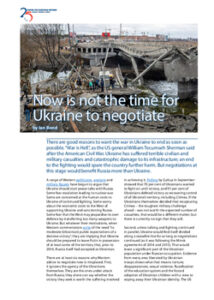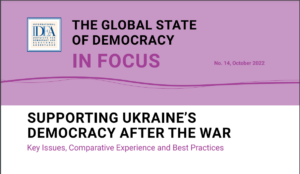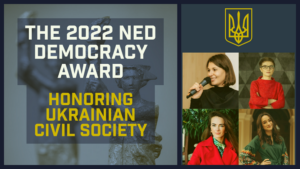 The United States needs to make explicit that it supports Ukrainian victory and Russian defeat in terms of the Kremlin’s strategic goal of destroying the Ukrainian nation and Ukrainian identity, according to a strategy paper from the Atlantic Council. It should commit to helping the Ukrainian people achieve a democratic, independent, sovereign, prosperous Ukraine that has the means to deter and defend itself against any future Russian aggression, say authors Stephen J. Hadley, Ambassador William B. Taylor, John E. Herbst, Matthew Kroenig, Melinda Haring and Jeffrey Cimmino.
The United States needs to make explicit that it supports Ukrainian victory and Russian defeat in terms of the Kremlin’s strategic goal of destroying the Ukrainian nation and Ukrainian identity, according to a strategy paper from the Atlantic Council. It should commit to helping the Ukrainian people achieve a democratic, independent, sovereign, prosperous Ukraine that has the means to deter and defend itself against any future Russian aggression, say authors Stephen J. Hadley, Ambassador William B. Taylor, John E. Herbst, Matthew Kroenig, Melinda Haring and Jeffrey Cimmino.
There are at least six reasons why Western advice that Ukraine should now negotiate with Russia is misplaced, writes Ian Bond of the Center for European Reform:
- First, it ignores the agency of the Ukrainians themselves. They are the ones under attack from Russia; they alone can say whether the victory they seek is worth the suffering involved in achieving it. Polling by Gallup in September showed that 70 per cent of Ukrainians wanted to fight on until victory, and 91 per cent of Ukrainians defined victory as recovering control of all Ukraine’s territory, including Crimea. …
- Second, unless talking and fighting continued in parallel, Ukraine would find itself divided along a ceasefire line for as long as negotiations continued (as it was following the Minsk agreements of 2014 and 2015). That would leave a significant part of the Ukrainian population under Russian occupation. …
- Third, there is a risk that those pushing for negotiations will increase damaging divisions within the West, when unity is most vital. ….Some in the West may criticise Kyiv as happy to take Western weapons but not Western advice. By contrast, Kyiv may be frustrated that even after nine months of brutal war some of its Western partners are still more concerned that a Ukrainian victory will provoke Putin into using nuclear weapons than they are worried about the effect of a Russian victory on Ukraine and its people.
 Fourth, linking pressure on Ukraine to negotiate with Putin’s threats of escalation would set a disastrous international precedent. If the US and its allies back down in the face of nuclear or energy blackmail on this occasion, why would Putin believe they would defend the Baltic States or others in the face of similar Russian threats? …
Fourth, linking pressure on Ukraine to negotiate with Putin’s threats of escalation would set a disastrous international precedent. If the US and its allies back down in the face of nuclear or energy blackmail on this occasion, why would Putin believe they would defend the Baltic States or others in the face of similar Russian threats? …- Fifth, offering Putin negotiations, and presumably a pause in fighting when his forces are under pressure, would give Russia the chance to reconstitute its forces and refill its arsenals in preparation for a renewed attack on Ukraine. Putin has believed for a long time that “Ukraine is not even a country”. As long as he is in power, his goal will remain to reunite those he regards as the ‘Russian’ peoples of Ukraine and Russia. …
- Finally, despite the setbacks Russia has suffered so far, there is no sign that Putin himself or those around him are looking for ‘off-ramps’. ….Putin sees Western talk of off-ramps as an indication that the West itself is looking for a way out of the conflict, and therefore as a reason for him to apply more pressure. Talk of negotiations now will only reinforce his belief that time is on his side. RTWT
 How can the war on Ukraine impact the sustainability of democracy worldwide and what role can funders play in strengthening local civil society long-term?
How can the war on Ukraine impact the sustainability of democracy worldwide and what role can funders play in strengthening local civil society long-term?
Join the Community Foundations of Canada, Philanthropic Foundations Canada, Charles Stewart Mott Foundation, and the German Marshall Fund of the United States for a funder-only roundtable series featuring guest speakers with deep expertise on the war and its ramifications.
Location – Zoom
Moderator
- Martina Hrvolova, Resident Fellow and Senior Advisor to the Transatlantic Democracy Working Group, The German Marshall Fund of the United States (GMF)
 Speakers
Speakers
- Inna Pidluska, Deputy Executive Director, International Renaissance Foundation
- Carl Gershman, former President of the National Endowment for Democracy (NED)
- Anthony Richter, Director of Special Initiatives, The Open Society Foundations
Moscow’s effort to switch off the lights in an entire country should be resisted, even as #Ukraine is assisted with urgently needed weapons and technical help by the West, analyst @michaelh992 @LeBeckInt writes for @NEDemocracy partner @cepa. https://t.co/AtsOq0KAS5
— Democracy Digest (@demdigest) December 1, 2022







